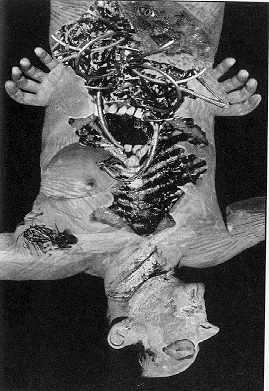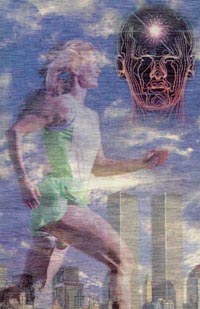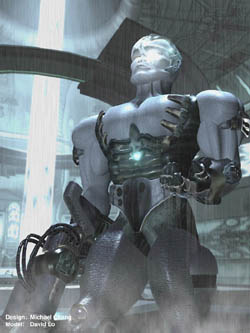MINDBODYMEDIA with Professor Keefer



Wednesday evenings, Summer 2006
What are the media doing to our minds and bodies?
What have they done and what will they do?
What qualities of our humanity do these media
enhance, what do they dwarf?
How do the various media differ in their influence
on our MINDBODYSPIRIT?
How will our minds and bodies change with technical advances in enhancements, replacements and Artificial Intelligence?
How can you develop your own media theory?
Choose a Megalo or a Monster: Frankenstein, Alice in Wonderland, Dorian Gray, Cyborg, Dr. Jekyll and Mr.Hyde, Grenouille, Madonna/Marilyn, Frankenstein, Batman, Superman, Spiderwoman, Terminator, King Kong
Choose a Medium: Print, Radio, TV, Internet, Weapons, Wheels, Flight
Create a Media Theory, from the POV of your Character, using your Medium to Cover:
Past, Present and Predictions of the Future
Evaluate the ethics of your theory in terms of the utopia or dystopia it might produce
Improve visual, oral and linguistic skills, connect the discipline of media studies with literature, philosophy, sociology, technology and medical science
Have fun watching movies, reading great books and using your imagination to create new theories!
OBJECTIVES:
1) To analyze past, present and
future media trends from the POV of MINDBODYMEDIA
2) To develop your unique media theory
3) To continue the departmental focus
on interdisciplinary studies by combining media theory and history with
literature, psychology, creative writing, acting and web design.
In terms of skill, students will improve writing
in all genre, public speaking and debate, web design, and creativity, imagination
and critical thinking. In terms of content, students will read both fiction
and expository cutting edge academic research as well as see films, comparing
efforts to extend our being through technology and science from the eighteenth
to the twenty first centuries with an emphasis on internet global communication,
futuristic speculations, and the philosophy, ethics, legality, biology and
sociology of Artificial Life and the incremental innovations that will lead
to it.
We will primarily be analyzing the media of expression
and communication such as the internet, movies, TV, radio, and print, and
will focus on the ultimate transformation of our humanity into artificial
life. Therefore you can either do projects on artificial life, bionic implants
etc. or any way that our minds and bodies are transformed by these technological
extensions. Surf through student projects in other classes, particularly YOUR
COMMUNITY ONLINE and LANGUAGE
AND THE BODY or other Keefer courses from the
home page.
Required Reading: Frankenstein by Mary Shelley,
How to Survive as an Adjunct Professor by Wrestling by Julia Keefer, Dr. Jekyll and Mr. Hyde by Robert Louis Stevenson, Alice's Adventures in
Wonderland, A Natural History of the Senses by Diane Ackerman, Perfume by
Patrick Suskind, A Picture of Dorian Gray, The Age of Spiritual Machines
by Ray Kurzweil, Metal and Flesh by Ollivier Dyens, Understanding Media by
McLuhan.
Requirements and Grading: 20 points attendance
and participation. Five little progress papers --10 points each due throughout
the semester. Final project edited, enhanced and enlarged for 30 points.
We will then have a party where your
character reacts spontaneously based on your research.
Breakdown
May 17: Introductory Lecture. Games, exercises
and films. Lecture on extensions. Read Understanding Media and first 9 chapters of Un-clashing Civilizations in HOW TO SURVIVE AS AN ADJUNCT PROFESSOR BY WRESTLING. Pick a character. Begin media diary.
May 24: Analyze Superman. Discuss extensions. Lecture on narcissism and megalomania in media. Read the Picture of Dorian Gray and favorite chapters from Megalomania of the Twentieth Century, Part I of How to Survive as an Adjunct Professor by Wrestling.
June 7: Discuss The Picture of Dorian Gray. Analyze excerpts of Batman. Character analysis and monologue due.
June 14: Creative Writing meeting at the Ireland House. Analyze books as media. How does book publishing differ from Internet publishing? Sensory and Cognitive description of
chosen medium due. How does the medium relate to the human mindbody? Read Frankenstein.
June 21: Monsters and Madmen. See films, discussion, do improvisational
writing and acting. Read Perfume.
June 28: Past history of medium in character's
voice due. Bifurcated personalities. Read Dr. Jekyll and Mr. Hyde.
July 5: See film of Dr. Jekyll and Mr. Hyde. Read Metal and Flesh.
July 12: See films, discussion, improvisational
acting and writing. Read The Age of Spiritual Machines.
July 14: Class makeup at the Met. Meet at the Temple of Dendur at 6:30 Friday night.
July 19: Present situation of medium in character's
voice due. What problems and inequities do you find?
July 26: Future predictions due.
August 2 : Party for the Madonnas/Marilyns, Monsters,
Madmen and Madwomen, and Megalos. Interaction in creative circumstances.
Final papers and webfolios due.
You can also read student papers from the Keefer website: Post
Traumatic Stress Syndrome in VR, MUDS and MOOS, Reality
TV, Excessive Internet Use Among Teenagers or Housewives, Searching
for a Marital Partner Online, The
Influence of MINDBODY American TV Images of Hinduism, Cyberspace
and the Noosphere, Afro-American
Images Online, The
Lack of Qualia in Online Communication, Virtual
Reality in Respiratory Care. Learn more about
physics through this
brilliant animation site. Come to ALICE
IN WONDERLAND, courtesy of Brian Buckmann and Jean Marc Gulliet. Explore MINDBODYMEDIA
through this spectacular design site.
Come to the 3DVR Panorama of BIONIC BEINGS directed by Brian B, I and IIWebfolios of the Bionic Beings
Brian
Jean Marc
Michael
Philip
Jeremy
Deborah
Maxim
Richard
Sarah
Victoria
Nataly
Nadia
Lorna
Christian
Nilda
Michal
Patricia
Research Projects directed
by
Brian
Buchmann, Director of Bionic Beings
Jean Marc Gulliet,
Director of Philosophical Obstacles
Michael Hastings,
Image Consultant for Bionic Beings, Clones, Cyborgs etc
Richard McCulloch,
Legal Advocate for equal rights for all of the above
Sarah Needham and Victoria
Mellotti, Mock PR Consultants for MIT's AI project
Michal Hanuka, Problem
Solver
Jeremy Schwartz,
Risk/Luck Analyst
Religious Objectors:
Deborah Dawson for Rabbis, Philip
Simon for Muslims
Max,
Perfection/Imperfection Analyst
Patricia Oscategui,
Pain and Sacrifice Analyst
Afari Christian:
AIDS in South Africa
Lorna Baker:
Pedagogical Consultant
Nataly Gabra-Mariam:
Emotional Memory of Robots
Nilda Diaz: Financial
Advisor and Tourist Guide
Nadia Sattar:
Data Smog Consultant
What will happen to US when the Bionic Beings, Clones, Cyborgs etc are fully empowered?
How would it feel like to be an Enhanced Being?
Optional Reading List
Abram, David. THE SPELL OF THE SENSUOUS.
Ackerman, Diane. A NATURAL HISTORY OF THE SENSES.
Baker, Robin. SEX IN THE FUTURE: ANCIENT URGES MEET FUTURE TECHNOLOGY.
Brown, Norman O. LOVE'S BODY.
Bruyere, Rosalyn L. WHEELS OF LIGHT.
Carroll, Lewis. ALICE'S ADVENTURES IN WONDERLAND.
Castells, Manuel. THE INFO AGE (Blackwell)
Campbell, Richard. MEDIA AND CULTURE.
Critical Art Ensemble. THE ELECTRONIC DISTURBANCE.
Descartes, Rene. DISCOURSE ON THE METHOD AND THE MEDITATIONS.
Garfinkle. ARCHITECTS OF THE INFO AGE. Mit Press, 2000.
Gershenfeld, Neil. WHEN THINGS START TO THINK. Henry Holt, 1999.
Gibson, William. NEUROMANCER.
Hall, Edward T. THE HIDDEN DIMENSION.
Hardcastle, Valerie Gray. THE MYTH OF PAIN.
The Holy Eucharist. New Testament.
Helmreich, Stephan. SILICON SECOND NATURE.
Horrocks, Christopher. MARSHAL McLUHAN and VIRTUALITY.
Jastrow, Robert. GOD AND THE ASTRONOMERS.
Johnson, Steven. INTERFACE CULTURE.
Judith, Anodea. WHEELS OF LIFE.
Kearns, Salla and Cohn. ADVANCES IN NEURAL PROCESSING SYSTEMS.
Mit Press, 2000.
Kroker, Arthur and Marilouise. DIGITAL DELIRIUM.
Kurzweil, Ray. THE AGE OF SPIRITUAL MACHINES.
Leeson, Lynn Hershman. CLICKING IN: Hot Links to a Digital Culture.
McLuhan, Marshall. UNDERSTANDING MEDIA. THE MEDIUM IS THE MASSAGE.
WAR AND PEACE IN THE GLOBAL VILLAGE.
Manovich, Lev. LANGUAGE OF NEW MEDIA (MIT 2000)
Martin, James. AFTER THE INTERNET: ALIEN INTELLIGENCE.
Ong, Walter. ORALITY AND LITERACY.
Postman, Neil. BUILDING A BRIDGE TO THE 18TH CENTURY. New York:
Vintage Books, 1999.
Shelley, Mary. FRANKENSTEIN.
Shenk, David. DATA SMOG. HarperCollins, 1998.
Stefik, Mark. INTERNET DREAMS.
Stevenson, Robert Louis. DR. JEKYLL AND MR. HYDE.
Swift, Jonathan. GULLIVER'S TRAVELS.
Trend, David. READING DIGITAL CULTURE.
Turkle, Sherry. LIFE IN THE AGE OF THE INTERNET.
Internet Sources
http://www.amazon.com/exec/obidos/ASIN/0684843242/qid=965244236/sr=1-2/102-6254476-1553746
The Hacker Jargon File. June 2, 2000
http://www.tuxedo.org/~esr/jargon/
The Asheron�s Call Homepage., June 3, 2000
http://www.asheronscall.com
Slashdot: News for Nerds. June 9, 2000
http://www.slashdot.org
The Voluntary Human Extinction Movement.� June 3, 2000
http://www.vhemt.org/biobreed.htm#instinct
Ask Mynx?, July 25, 2000
www.planetquake.com/features/mynx
Gibbler�s Page. June 19, 2000
http://gibbler.virtualave.net
Zanshin�s GLDojo. June 9, 2000
http://www.planetquake.com/gldojo
FrostyFX. June 19, 2000
http://www.frostyfx.com
In addition, we will see Steven Spielberg's ARTIFICIAL INTELLIGENCE
and read selected articles from WIRED magazine.
At the beginning of the semester, create a Bionic or Extended
Being, a Frankenstein or Robot that you can take through your research or
into Digital Sandcastles, our chat room. In MINDBODYMEDIA, we are trying
to understand how and why humans create technological extensions, how our
lives are changed by living with them, and what the future possibilities
could be. We will surf a number of web sites, see films related to this topic,
read books including McLuhan and classical literature, and have in-class
writing, discussion and role-playing.
We look at technological extensions of the human mindbodyspirit:
the wheel which becomes the horse carriage, the train, the car, the plane, the
space shuttle and then the computer zooming through cyberspace-- the extension
of the legs, helping us conquer territory and consume space; the pen which becomes
the printing press, the typewriter and then the computer-- the extension of
our hands which becomes a weapon and expressive tool for our intellect, a way
of conquering information and enhancing communication for social exchange; and
finally musical instruments, the radio, TV, film and finally computer-- the
extension of our ears and eyes which helps us condense and compress time into
meaningful and/or entertaining sounds and images. All extensions naturally change
the brain and its processing. We explore how these extensions can become crutches
that atrophy the human body parts or enhancers that magnify what is both good
and bad about human potential. We look at the waste products of these extensions
and the damage they cause to us and the environment as well as the ways in which
they have improved our environments and standard of living. We contrast the
qualia or experiential state of our naked senses with the adrenalin rush and
speed and stress of the extensions. We look at how extensions come together
with artificial intelligence and robotics. We examine what we have lost and
gained when we add technological extensions to the human mindbodyspirit.
Principles from THE END OF EDUCATION by Neil Postman:
1. All technological change is a Faustian bargain.
For every advantage a new technology offers, there is always a corresponding
disadvantage.
2. The advantages and disadvantages of new technologies
are never distributed evenly among the population. This means that every new
technology benefits some and harms others.
3. Embedded in every technology there is a powerful
idea, sometimes two or three powerful ideas. Like language itself, a technology
predisposes us to favor and value certain perspectives and accomplishments and
to subordinate others. Every technology has a philosophy, which is given expression
in how the technology makes people use their minds, in what it makes us do with
our bodies, in how it codifies the world, in which of our senses it amplifies,
in which of our emotional and intellectual tendencies it disregards.
4. A new technology usually makes war against an
old technology. It competes with it for time, attention, money, prestige, and
a "worldview."
5. Technological change is not additive; it is
ecological. A new technology does not merely add something; it changes everything.
6. Because of the symbolic forms in which information
is encoded, different technologies have different intellectual and emotional
biases.
7. Because of the accessibility and speed of their
information, different technologies have different political biases.
8. Because of their physical form, different technologies
have different sensory biases.
9. Because of the conditions in which we attend
to them, different technologies have different social biases.
10. Because of their technical and economic structure,
different technologies have different content biases.
Possible Research Projects: You are free to design your own
project and bibliography on class theme
Projects can be either in APA or MLA style. In other words,
you can do a sociopolitical, economic, medical analysis related to mindbodymedia
or AI, or a close textual analysis comparing and contrasting different literary,
philosophical or historical texts, using the reading list and your own sources.
McLuhan and his Extensions: Are they still Applicable?
Swift, Postman and the Eighteenth Century: What will this
"Bridge" do for us? Has the mind body duality gotten worse?
Alice in Wonderland versus Frankenstein: The Wonders and
Horrors of Imagination (and MUDS and MOOS)
The Sociology of the Artificial Intelligence Communities:
Helmreich and the White Males (What kind of new elite will we create?)
The History and Hegemony of the MIT Media Lab: How does this
color the research?
Will Artificial Beings have Chakras? Ray Kurzweil and his Spiritual
Machines versus Kundalini Yoga
AI: The Threat to Christianity and Christian Constructs of the
MindBodySpirit (James Martin,The Bible, Voluntary Human Extinction and Christian
websites)
Fantasy Online with Alter Egos: Dr. Jekyll and Mr. Hyde with
Sherry Turkle
Does It Hurt? Pain, Sensuality and Robotics (Ackerman, Hardcastle
and Abram meet Alien Intelligence)
The New Brain: Data Smog and Digital Delirium Dally with Descartes
WIRED Business People and the Socioeconomic Implications of
AI: A Reductionist Intelligence?
The Biology versus Technology Competition: Cloning, Sperm Banks
versus Computational Creations
Dumbing Down for the Global Commuity--is it necessary? (Manovich and Castells)


